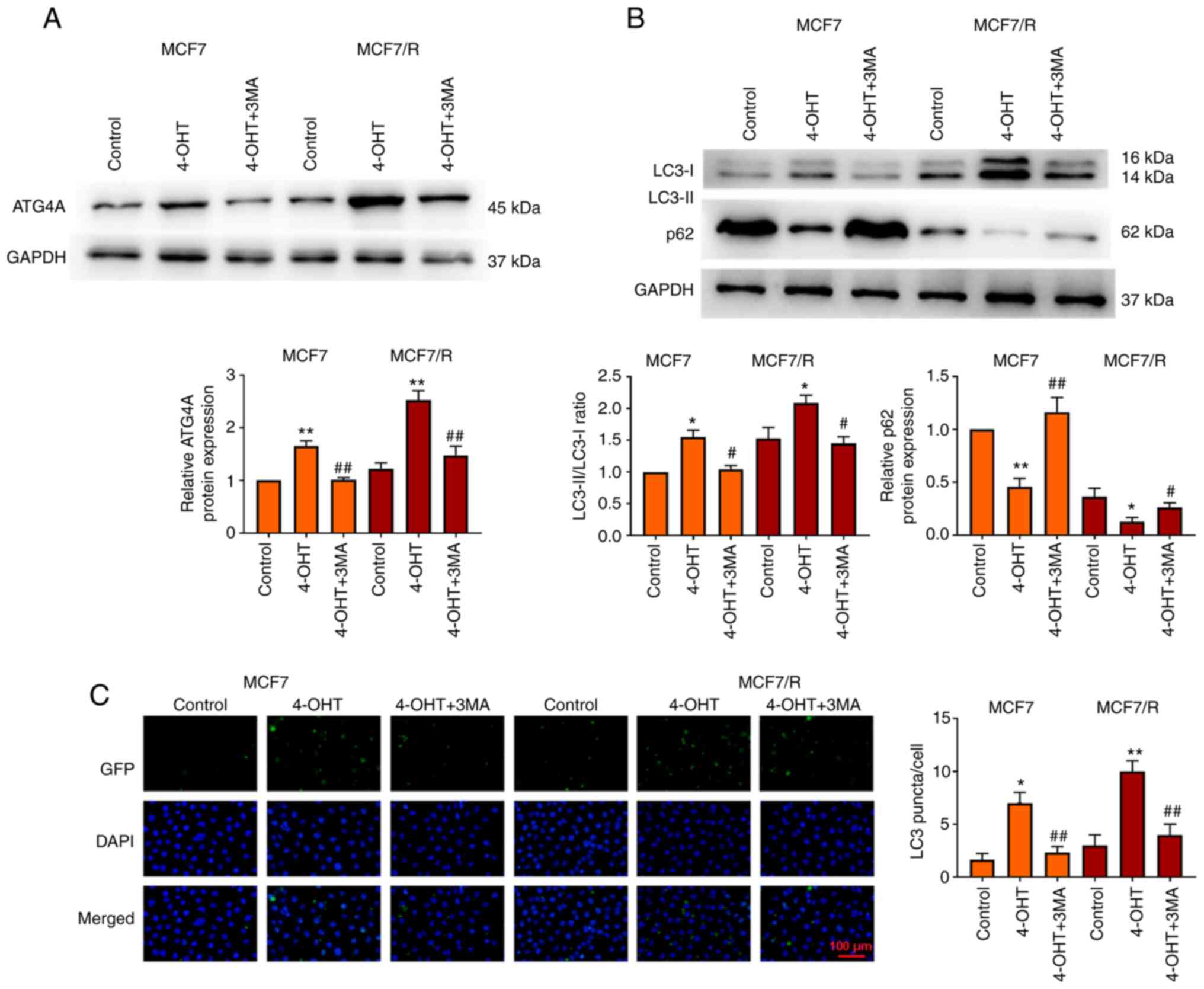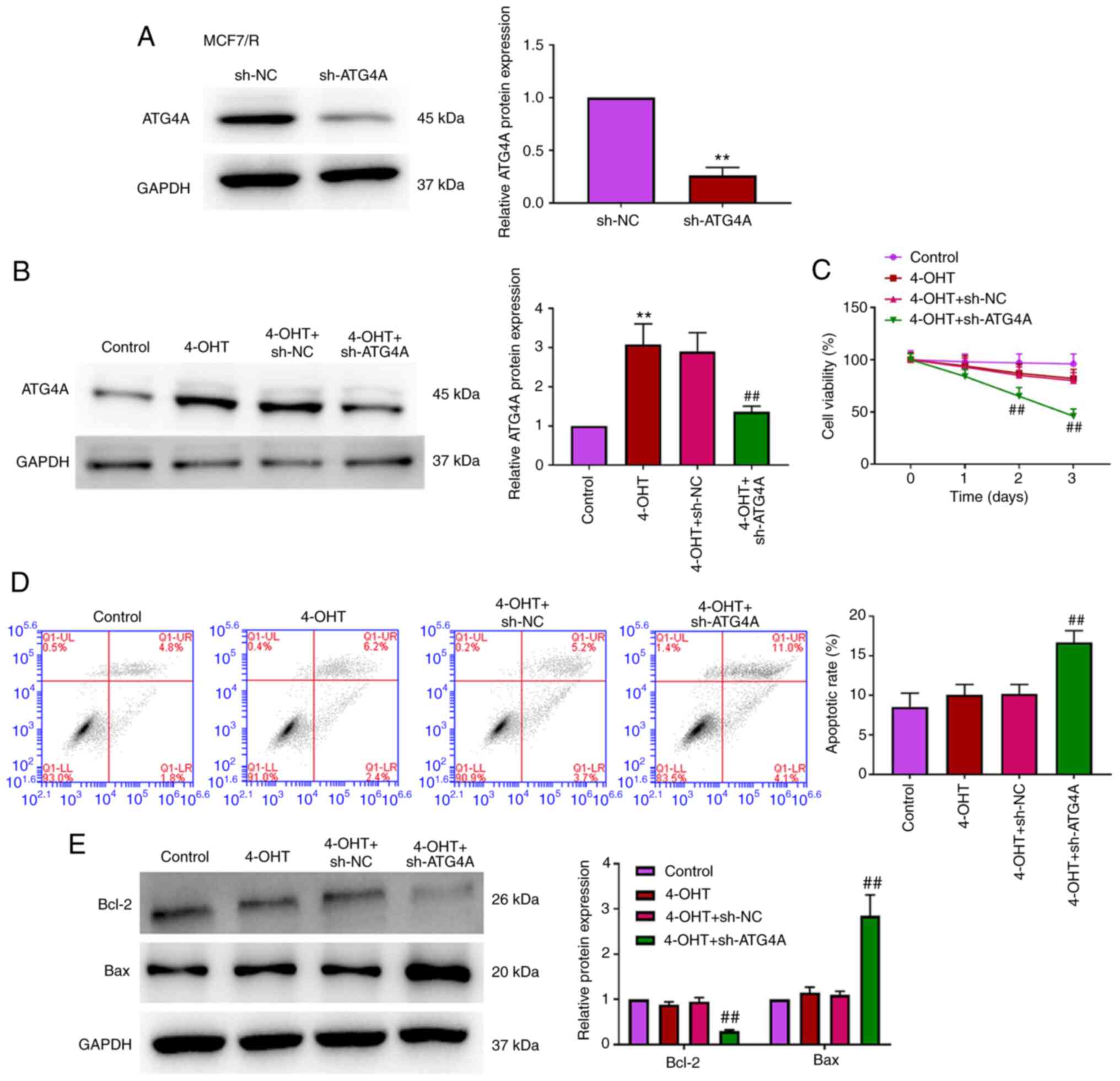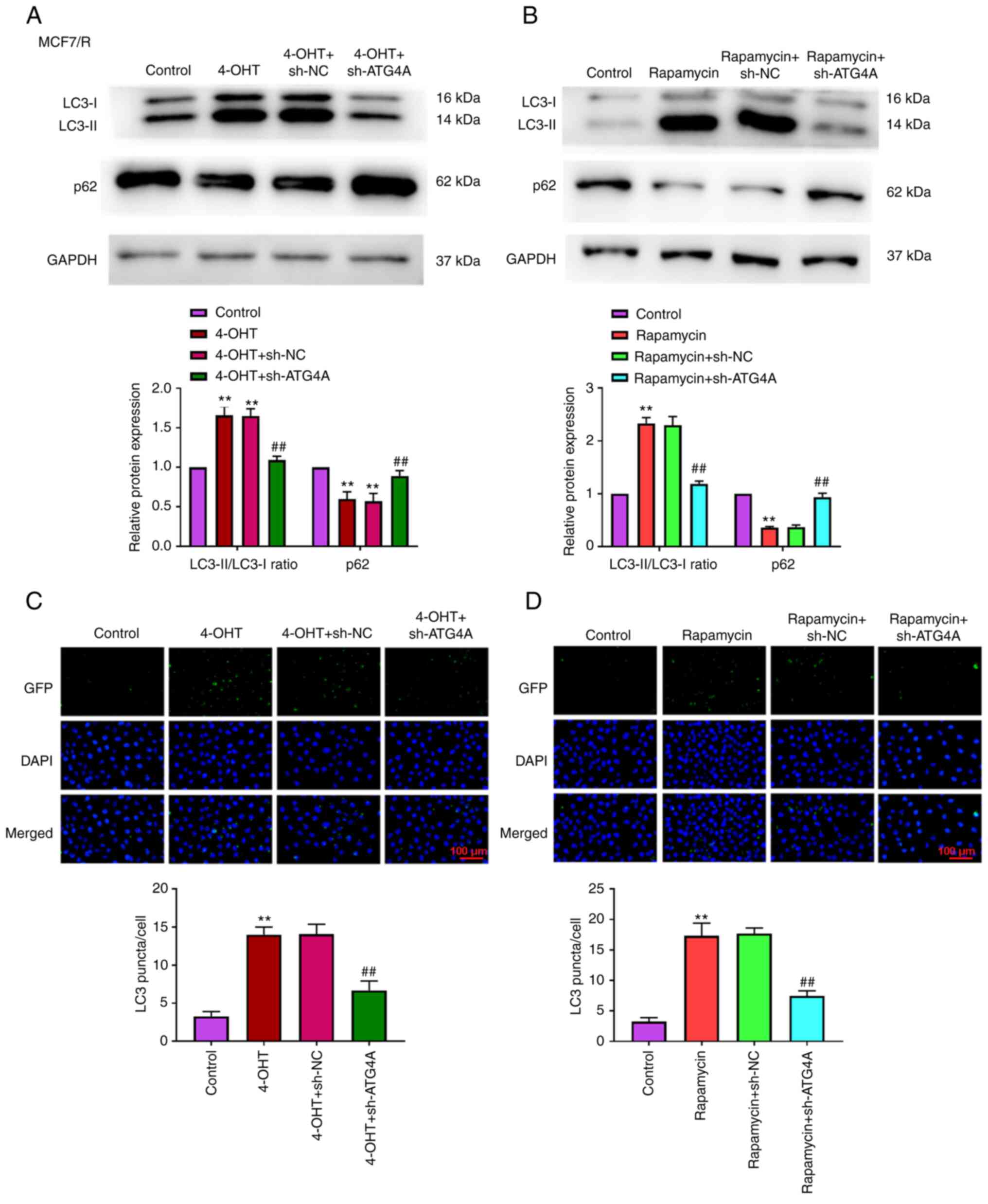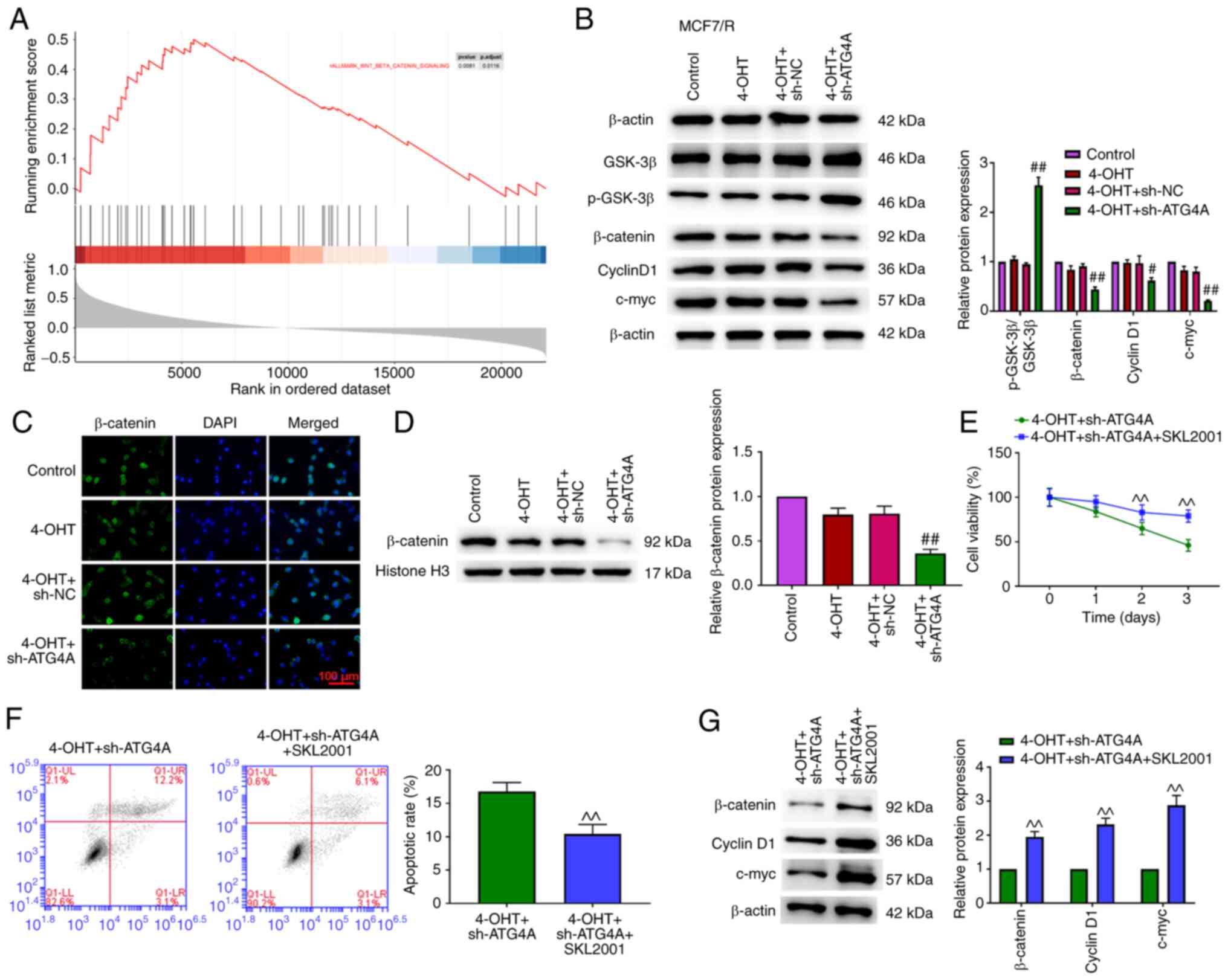|
1
|
Bray F, Ferlay J, Soerjomataram I, Siegel
RL, Torre LA and Jemal A: Global cancer statistics 2018: GLOBOCAN
estimates of incidence and mortality worldwide for 36 cancers in
185 countries. CA Cancer J Clin. 68:394–424. 2018. View Article : Google Scholar : PubMed/NCBI
|
|
2
|
Schoenlein PV, Periyasamy-Thandavan S,
Samaddar JS, Jackson WH and Barrett JT: Autophagy facilitates the
progression of ERalpha-positive breast cancer cells to antiestrogen
resistance. Autophagy. 5:400–403. 2009. View Article : Google Scholar : PubMed/NCBI
|
|
3
|
Jennings CJ, Zainal N, Dahlan IM, Kay EW,
Harvey BJ and Thomas W: Tamoxifen suppresses the growth of
malignant pleural mesothelioma cells. Anticancer Res. 36:5905–5913.
2016. View Article : Google Scholar : PubMed/NCBI
|
|
4
|
Shagufta and Ahmad I: Tamoxifen a
pioneering drug: An update on the therapeutic potential of
tamoxifen derivatives. Eur J Med Chem. 143:515–531. 2018.
View Article : Google Scholar : PubMed/NCBI
|
|
5
|
Early Breast Cancer Trialists'
Collaborative Group (EBCTCG), ; Davies C, Godwin J, Gray R, Clarke
M, Cutter D, Darby S, McGale P, Pan HC, Taylor C, et al: Relevance
of breast cancer hormone receptors and other factors to the
efficacy of adjuvant tamoxifen: Patient-level meta-analysis of
randomised trials. Lancet. 378:771–784. 2011. View Article : Google Scholar : PubMed/NCBI
|
|
6
|
Nass N and Kalinski T: Tamoxifen
resistance: From cell culture experiments towards novel biomarkers.
Pathol Res Pract. 211:189–197. 2015. View Article : Google Scholar : PubMed/NCBI
|
|
7
|
Li YJ, Lei YH, Yao N, Wang CR, Hu N, Ye
WC, Zhang DM and Chen ZS: Autophagy and multidrug resistance in
cancer. Chin J Cancer. 36:522017. View Article : Google Scholar : PubMed/NCBI
|
|
8
|
Liu J, Yue W and Chen H: The correlation
between autophagy and tamoxifen resistance in breast cancer. Int J
Clin Exp Pathol. 12:2066–2074. 2019.PubMed/NCBI
|
|
9
|
Samaddar JS, Gaddy VT, Duplantier J,
Thandavan SP, Shah M, Smith MJ, Browning D, Rawson J, Smith SB,
Barrett JT and Schoenlein PV: A role for macroautophagy in
protection against 4-hydroxytamoxifen-induced cell death and the
development of antiestrogen resistance. Mol Cancer Ther.
7:2977–2987. 2008. View Article : Google Scholar : PubMed/NCBI
|
|
10
|
Klionsky DJ: Citing recent declines in the
discovery of new ATG genes, some scientists now suggest that the
end of autophagy research may be within sight. Autophagy.
10:715–716. 2014. View Article : Google Scholar : PubMed/NCBI
|
|
11
|
Zhang L, Li J, Ouyang L, Liu B and Cheng
Y: Unraveling the roles of Atg4 proteases from autophagy modulation
to targeted cancer therapy. Cancer Lett. 373:19–26. 2016.
View Article : Google Scholar : PubMed/NCBI
|
|
12
|
Mariño G, Uría JA, Puente XS, Quesada V,
Bordallo J and López-Otín C: Human autophagins, a family of
cysteine proteinases potentially implicated in cell degradation by
autophagy. J Biol Chem. 278:3671–3678. 2003. View Article : Google Scholar : PubMed/NCBI
|
|
13
|
Betin VM and Lane JD: Atg4D at the
interface between autophagy and apoptosis. Autophagy. 5:1057–1059.
2009. View Article : Google Scholar : PubMed/NCBI
|
|
14
|
Su H, Zhu G, Rong X, Zhou Y, Jiang P and
Chen P: Upregulation of ATG4A promotes osteosarcoma cell
epithelial-to-mesenchymal transition through the Notch signaling
pathway. Int J Clin Exp Pathol. 10:7975–7982. 2017.PubMed/NCBI
|
|
15
|
Yang SW, Ping YF, Jiang YX, Luo X, Zhang
X, Bian XW and Yu PW: ATG4A promotes tumor metastasis by inducing
the epithelial-mesenchymal transition and stem-like properties in
gastric cells. Oncotarget. 7:39279–39292. 2016. View Article : Google Scholar : PubMed/NCBI
|
|
16
|
Wolf J, Dewi DL, Fredebohm J,
Müller-Decker K, Flechtenmacher C, Hoheisel JD and Boettcher M: A
mammosphere formation RNAi screen reveals that ATG4A promotes a
breast cancer stem-like phenotype. Breast Cancer Res. 15:R1092013.
View Article : Google Scholar : PubMed/NCBI
|
|
17
|
Colaprico A, Silva TC, Olsen C, Garofano
L, Cava C, Garolini D, Sabedot TS, Malta TM, Pagnotta SM,
Castiglioni I, et al: TCGAbiolinks: An R/Bioconductor package for
integrative analysis of TCGA data. Nucleic Acids Res. 44:e712016.
View Article : Google Scholar : PubMed/NCBI
|
|
18
|
Therneau TM: Survival Analysis [R package
survival version 2.41-3]. Technometrics. 46:111–112. 2015.
|
|
19
|
Yan C, Zhao J, Qin Y, Zhao F, Ji L and
Zhang J: Overexpression of ATG4a promotes autophagy and
proliferation, and inhibits apoptosis in lens epithelial cells via
the AMPK and Akt pathways. Mol Med Rep. 22:1295–1302. 2020.
View Article : Google Scholar : PubMed/NCBI
|
|
20
|
Guo L, Zhou L, Gao Q, Zhang A, Wei J, Hong
D, Chu Y, Duan X, Zhang Y and Xu G: MicroRNA-144-3p inhibits
autophagy activation and enhances Bacillus Calmette-Guérin
infection by targeting ATG4a in RAW264.7 macrophage cells. PLoS
One. 12:e01797722017. View Article : Google Scholar : PubMed/NCBI
|
|
21
|
Pan B, Chen Y, Song H, Xu Y, Wang R and
Chen L: Mir-24-3p downregulation contributes to VP16-DDP resistance
in small-cell lung cancer by targeting ATG4A. Oncotarget.
6:317–331. 2015. View Article : Google Scholar : PubMed/NCBI
|
|
22
|
Uppada SB, Gowrikumar S, Ahmad R, Kumar B,
Szeglin B, Chen X, Smith JJ, Batra SK, Singh AB and Dhawan P: MASTL
induces colon cancer progression and chemoresistance by promoting
Wnt/β-catenin signaling. Mol Cancer. 17:1112018. View Article : Google Scholar : PubMed/NCBI
|
|
23
|
Ohashi W, Yamamine N, Imura J and Hattori
Y: SKL2001 suppresses colon cancer spheroid growth through
regulation of the E-cadherin/β-Catenin complex. Biochem Biophys Res
Commun. 493:1342–1348. 2017. View Article : Google Scholar : PubMed/NCBI
|
|
24
|
Siegel RL, Miller KD and Jemal A: Cancer
statistics, 2016. CA Cancer J Clin. 66:7–30. 2016. View Article : Google Scholar : PubMed/NCBI
|
|
25
|
Gianni L, Baselga J, Eiermann W, Porta VG,
Semiglazov V, Lluch A, Zambetti M, Sabadell D, Raab G, Cussac AL,
et al: Phase III trial evaluating the addition of paclitaxel to
doxorubicin followed by cyclophosphamide, methotrexate, and
fluorouracil, as adjuvant or primary systemic therapy: European
cooperative trial in operable breast cancer. J Clin Oncol.
27:2474–2481. 2009. View Article : Google Scholar : PubMed/NCBI
|
|
26
|
Erol K, Baltali E, Altundag K, Guler N,
Ozisik Y, Onat DA, Sayek I, Cengiz M, Atahan L and Tekuzman G:
Neoadjuvant chemotherapy with cyclophosphamide, mitoxantrone, and
5-fluorouracil in locally advanced breast cancer. Onkologie.
28:81–85. 2005.PubMed/NCBI
|
|
27
|
Harbeck N and Gnant M: Breast cancer.
Lancet. 389:1134–1150. 2017. View Article : Google Scholar : PubMed/NCBI
|
|
28
|
Ignatiadis M and Sotiriou C: Luminal
breast cancer: From biology to treatment. Nat Rev Clin Oncol.
10:494–506. 2013. View Article : Google Scholar : PubMed/NCBI
|
|
29
|
Mansouri S, Feizi N, Mahdi A,
Majidzadeh-AK and Farahmand L: A review on the role of VEGF in
tamoxifen resistance. Anticancer Agents Med Chem. 18:2006–2009.
2018. View Article : Google Scholar : PubMed/NCBI
|
|
30
|
Szostakowska M, Trębińska-Stryjewska A,
Grzybowska EA and Fabisiewicz A: Resistance to endocrine therapy in
breast cancer: Molecular mechanisms and future goals. Breast Cancer
Res Treat. 173:489–497. 2019. View Article : Google Scholar : PubMed/NCBI
|
|
31
|
Ali S, Mondal N, Choudhry H, Rasool M,
Pushparaj PN, Khan MA, Mahfooz M, Sami GA, Jarullah J, Ali A and
Jamal MS: Current management strategies in breast cancer by
targeting key altered molecular players. Front Oncol. 6:452016.
View Article : Google Scholar : PubMed/NCBI
|
|
32
|
Du JX, Chen C, Luo YH, Cai JL, Cai CZ, Xu
J, Ni XJ and Zhu W: Establishment and validation of a novel
autophagy-related gene signature for patients with breast cancer.
Gene. 762:1449742020. View Article : Google Scholar : PubMed/NCBI
|
|
33
|
Bhat P, Kriel J, Shubha Priya B, Basappa,
Shivananju NS and Loos B: Modulating autophagy in cancer therapy:
Advancements and challenges for cancer cell death sensitization.
Biochem Pharmacol. 147:170–182. 2018. View Article : Google Scholar : PubMed/NCBI
|
|
34
|
Mizushima N: Methods for monitoring
autophagy using GFP-LC3 transgenic mice. Methods Enzymol.
452:13–23. 2009. View Article : Google Scholar : PubMed/NCBI
|
|
35
|
Ravikumar B, Sarkar S, Davies JE, Futter
M, Garcia-Arencibia M, Green-Thompson ZW, Jimenez-Sanchez M,
Korolchuk VI, Lichtenberg M, Luo S, et al: Regulation of mammalian
autophagy in physiology and pathophysiology. Physiol Rev.
90:1383–1435. 2010. View Article : Google Scholar : PubMed/NCBI
|
|
36
|
Rothe K, Lin H, Lin KB, Leung A, Wang HM,
Malekesmaeili M, Brinkman RR, Forrest DL, Gorski SM and Jiang X:
The core autophagy protein ATG4B is a potential biomarker and
therapeutic target in CML stem/progenitor cells. Blood.
123:3622–3634. 2014. View Article : Google Scholar : PubMed/NCBI
|
|
37
|
Wen ZP, Zeng WJ, Chen YH, Li H, Wang JY,
Cheng Q, Yu J, Zhou HH, Liu ZZ, Xiao J and Chen XP: Knockdown ATG4C
inhibits gliomas progression and promotes temozolomide
chemosensitivity by suppressing autophagic flux. J Exp Clin Cancer
Res. 38:2982019. View Article : Google Scholar : PubMed/NCBI
|
|
38
|
Pawlik A, Słomińska-Wojewódzka M and
Herman-Antosiewicz A: Sensitization of estrogen receptor-positive
breast cancer cell lines to 4-hydroxytamoxifen by isothiocyanates
present in cruciferous plants. Eur J Nutr. 55:1165–1180. 2016.
View Article : Google Scholar : PubMed/NCBI
|
|
39
|
Yu X, Luo A, Liu Y, Wang S, Li Y, Shi W,
Liu Z and Qu X: MiR-214 increases the sensitivity of breast cancer
cells to tamoxifen and fulvestrant through inhibition of autophagy.
Mol Cancer. 14:2082015. View Article : Google Scholar : PubMed/NCBI
|
|
40
|
Yu J, Liu D, Sun X, Yang K, Yao J, Cheng
C, Wang C and Zheng J: CDX2 inhibits the proliferation and tumor
formation of colon cancer cells by suppressing Wnt/β-catenin
signaling via transactivation of GSK-3β and Axin2 expression. Cell
Death Dis. 10:262019. View Article : Google Scholar : PubMed/NCBI
|
|
41
|
Xu C, Liu F, Xiang G, Wang S, Liu J, Meng
Q, Xu D, Lv S, Jiao J and Niu Y: β-Catenin nuclear localization
positively feeds back on EGF/EGFR-attenuated AJAP1 expression in
breast cancer. J Exp Clin Cancer Res. 38:2382019. View Article : Google Scholar : PubMed/NCBI
|
|
42
|
Liu S, Wang L, Ding W, Wang D, Wang X, Luo
Q, Lu Y and Zhu L: Cleistanthin A inhibits the invasion of
MDA-MB-231 human breast cancer cells: Involvement of the β-catenin
pathway. Pharmacol Rep. 72:188–198. 2020. View Article : Google Scholar : PubMed/NCBI
|
|
43
|
Li P, Feng C, Chen H, Jiang Y, Cao F, Liu
J and Liu P: Elevated CRB3 expression suppresses breast cancer
stemness by inhibiting β-catenin signalling to restore tamoxifen
sensitivity. J Cell Mol Med. 22:3423–3433. 2018. View Article : Google Scholar : PubMed/NCBI
|
|
44
|
Liu T, Wang Y, Zhang Z, Zhang Z, Li Y, Cui
Y, Li Z, Liu H, Zhang Y, Wang Y and Ma S: MS-275 combined with
cisplatin exerts synergistic antitumor effects in human esophageal
squamous cell carcinoma cells. Toxicol Appl Pharmacol.
23:1149712020. View Article : Google Scholar : PubMed/NCBI
|
|
45
|
Zhang Y, Li Z, Zhao W, Hu H, Zhao L, Zhu
Y, Yang X, Gao B, Yang H, Huang Y and Song X: WD repeat and SOCS
box containing protein 2 in the proliferation, cycle progression,
and migration of melanoma cells. Biomed Pharmacother.
116:1089742019. View Article : Google Scholar : PubMed/NCBI
|



















